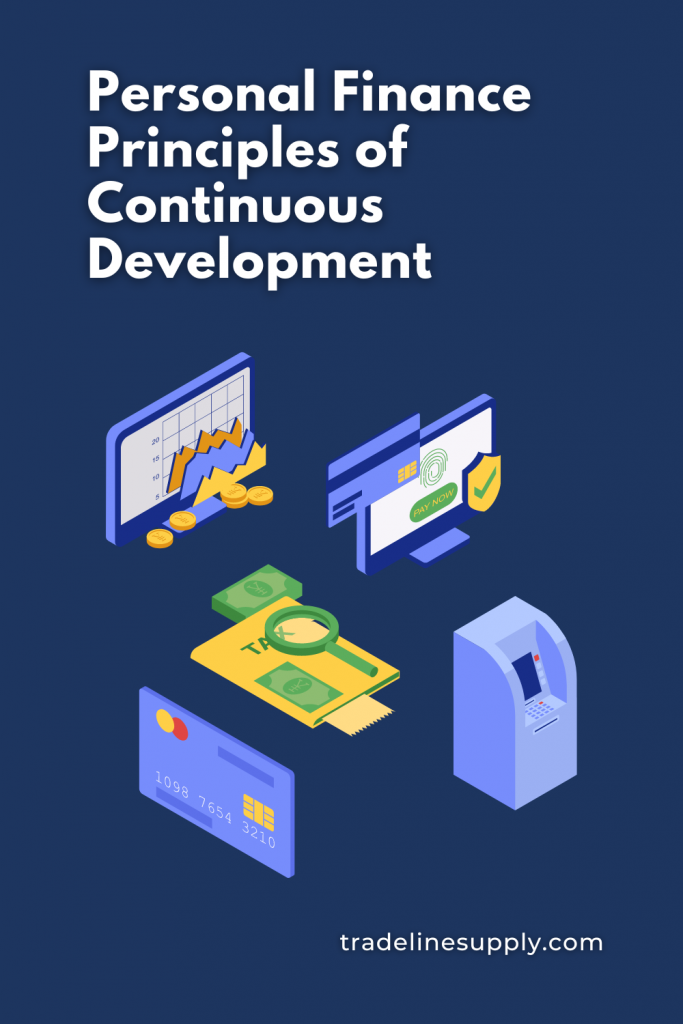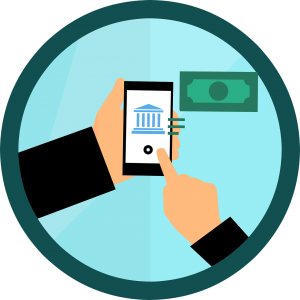Personal Finance Principles of Continuous Development

How to Use a Budget to Improve Your Credit Score
05/25/2022
Principles of Power in Personal Finance
06/17/2022 In the business world, “principles of continuous development” guide the top professionals and companies to financial success. What does this mean to the rest of us, and how can we take advantage of these principles in our own lives?
In the business world, “principles of continuous development” guide the top professionals and companies to financial success. What does this mean to the rest of us, and how can we take advantage of these principles in our own lives?
In plain English, “continuous development” translates to a state of constant improvement. The usefulness of this concept is not limited to business. It can serve you well in any area of life you want to continue developing and perfecting over time.
Specifically, in this article, we’ll show you how the mindset of continuous development and the principles of lean business can be applied to your personal finances to slash financial waste, increase the quality of your money, optimize your financial systems, and more.
Read on to learn about the following topics:
- How to eliminate financial waste
- How to expand financial quality
- Building your financial knowledge
- Making agile commitments
- The importance of respecting people
- How to develop your holistic financial mindset
Step #1: Find Out Where Your Money Is Needlessly Disappearing
The first step in improving your finances and developing a sophisticated approach to money is to understand where your money is going. Once you get clear on your cash flow, you can identify where your money is being wasted or used inefficiently, In other words, you’ll be able to redirect funds that are not being used in support of your higher financial goals.
Examples of Financial Waste
Almost everyone has some financial waste getting in the way of optimizing their money. Some common examples of financial waste include:
- Impulse purchases that do not add value to your life.
- Aspirational items that go unused, such as neglected workout equipment, books you never get around to reading, food that goes bad, or clothing you do not regularly wear.
- Buying things because they are on sale even though you do not need the products.
- Money you spend on impressing others rather than improving your own life.
- Subscription services or memberships that you no longer use but have not canceled.
- Keeping a large amount of cash in a bank account instead of investing the money where it can work for you to earn a better return.
- Paying monthly maintenance fees to your bank or high management fees on your investments.
Easy Ways to Find Your Financial Waste
Fortunately, since modern banking technology allows us to quickly access our financial information, it is easy to get a handle on how you are spending your money and identify where financial waste is draining your accounts.
Manual Expense Tracking
One way to find the waste is to manually track your spending. This can be done by looking over your bank account or credit card statements, categorizing every purchase, and entering each purchase into a spreadsheet. Some consumers may prefer to keep a handwritten spending journal. These methods allow you to get granular with your cash flow and spot the wasteful purchases with your own eyes.
Budgeting Apps
If manually tracking your spending is not your style, there are many types of budgeting software programs that can help by automatically categorizing your purchases and breaking down your spending for you. Mint, Goodbudget, and You Need a Budget (YNAB) are popular apps, but there are many options to choose from for those seeking to develop a leaner approach to their spending.
What You Should Do About Financial Waste
The solution to financial waste will depend on how and why the money is being wasted, which is why it’s crucial to take a close look at your outgoing cash.
Some sources of financial waste are relatively easy to fix. For example, unused subscriptions and memberships are low-hanging fruit because all you have to do is cancel the programs in order to stop spending money on them.
Choosing the right home for your money is important for eliminating waste as well. If you are wasting money on unnecessary banking fees, consider moving your funds to a bank that offers fee-free accounts. Similarly, if your cash is earning the bare minimum in interest, opt for an investment with a higher long-term return or switch to a high-yield savings account.
Other money drains may be more difficult to resolve due to the complexities of our psychology surrounding finances. If you overspend on things you don’t need or that don’t align with your values, reducing these waste streams will require doing some deeper work on your money mindset and behavioral patterns.
When You Should Act to Eliminate Wasted Money
Now is the time to act ruthlessly to slim down your financial waste. The sooner you stop the financial bleed, the sooner you can redirect that money to where it will best serve you.
Ultimately, freeing up these wasted funds will allow you to more effectively pay off debt, save for emergencies, invest for your future, and achieve your financial goals.
Step #2: Keep Building Financial Quality
Just as developing quality products is central to running a lean business, prioritizing quality is also important in money matters.
See How Your Finances Are Organized
Keeping your finances organized is essential in building up quality in your finances.
Having a disorganized financial system, on the other hand, sacrifices quality because you don’t have a vision for your money and a job for each dollar. Consequently, you may not be using your money in ways that add quality to your life.
For example, if your personal finance system consists of putting all of your money into one checking account, you may fall into the trap of spending your money in a disorganized way. When the only metric you see is the balance of your checking account, it is easy to spend thoughtlessly until the account is empty. This leaves you with no money left over for important long-term goals, such as retirement, and keeps you stuck living paycheck-to-paycheck.
Enhance Quality by Aligning Your Money With Your Values
You can improve the quality of your finances by organizing your money based on your goals and values. Knowing what is most important to you allows you to use your money as a tool to accomplish these aims.
As a hypothetical example, perhaps you dream of spending your retirement traveling the globe. You’ll need to consistently set aside money toward that goal so that you can fund the lifestyle you want once you reach retirement.
Getting clear on what your goal is, what you will gain from it, and how to accomplish it can motivate you to stop spending money on things that are less valuable to you so that you can save for what really matters.
Many consumers find success in organizing their finances by setting aside funds that are designated for specific purposes. Establishing sinking funds for your various money goals can help you save for each goal. track your progress, and stay motivated. With so many fee-free online banks to choose from, you can open up several savings accounts and earmark each one for a specific purpose so you know exactly what the money in that account is for.
Automate Your Money
Automating your finances can dramatically increase the quality of your financial life by reducing the potential for mistakes and making it more efficient to manage your money.
If you want to streamline your finances with automation, here are some examples of strategies to consider:
- Set up automatic payments for all of your bills so that you never forget to make a payment on time.
- Have your paycheck deposited directly into your bank account instead of receiving paper checks that require an extra step to deposit.
- Schedule recurring transfers to high-yield savings accounts to put money away without having to think about it.
- Take advantage of dollar-cost averaging by automating trades within your investment accounts.
As you improve your financial habits with automation and build up quality in your finances, it becomes easier to direct more funds toward creating your ideal life.
Step #3: Expand Your Financial Knowledge
Knowledge is the keystone of any solid financial plan, and expanding your financial knowledge should be a constant process. Learning about personal finance allows you to implement best practices and smart systems in managing your money.
Sources to Build a Wealth of Knowledge
Today, thousands of sources of valuable financial wisdom are only as far away as your computer or smartphone. Here are some suggestions for learning more about personal finance:
- Reputable websites such as:
- Podcasts like:
- YouTube channels including:
- Books or audiobooks on personal finance such as:
- Financial blogs like:
Understanding Your Own Finances
Knowledge of financial principles is helpful, but even more important is understanding your own finances. To get a handle on your financial health, you’ll need to take stock of your expenses, income, debts, savings, investments, and other assets.
These are actions you can take to develop your knowledge of where you stand financially and empower yourself to improve your situation.
- Check your credit scores and credit reports for errors and fraudulent activity and address any inaccurate information.
- Work with a Certified Financial Planner (CFP) or financial advisor to analyze your information and create an action plan.
- Check your accounts regularly to see where you stand.
- Consider if you are on track to meet your upcoming financial goals.
Step #4: How to Make Agile Commitments
While most advice does not recommend waiting until the last minute to make decisions, in order to continuously develop your finances, it can be ideal to keep your options open as long as possible.
Don’t Make Commitments Too Far in Advance
Not making commitments too far in advance allows you to be ready to take advantage of financial opportunities that arise. For example, if you spot a great investment opportunity, you need to be able to free up cash quickly so you can make a purchase, and that can’t happen if you’ve already committed the funds to something else.
Maximize Information to Make the Best Decisions
Deferring commitment also gives you as much time as possible to collect information before making a decision, which reduces the risk of making a poor decision based on insufficient information.
In the world of personal finance, this may look like deciding to make a big purchase before taking the time to research your options, whereas deferring the decision in order to gather more data could have led you to buy the item at a better value somewhere else.
Step #5: Be Ready to Pounce Fast
Once you have settled on a decision, though, you’ll want to be able to act quickly to work toward your money goals.
Preparing for a Purchase
If you know you want to buy a house or a car in the near future, it’s best to be prepared to make an offer as soon as you find the perfect home or vehicle. That means you’ll need cash for a down payment, so don’t commit it toward other priorities ahead of your big purchase.
Grow Your Money Faster by Investing Early
If you know you need to be saving for retirement, don’t delay opening an account and setting up deposits.
This is especially important when it comes to investments. The longer your money stays invested in the market, your returns grow exponentially due to compounding interest. For this reason, investing now is more valuable than waiting until you have a larger sum to participate.
Address Problems Before They Become Disasters
Having the ability to move quickly means that you can nip problems in the bud, before they become financially disastrous.
If you put off repairing a small leak in your home because you do not have the resources on hand to deal with it, soon you may be having to replace the entire floor due to water damage, which will certainly be far more costly and inconvenient.
The same logic is true of many other issues, such as medical issues, car repairs, etc. Don’t wait until a problem becomes an emergency to address it. Preventing problems and treating them at the root is a more effective use of your money.
Step #6: Respect People in Your Financial Community
You may be wondering what respecting people has to do with finances or lean business practices, but respect is essential to empowering yourself and others to succeed financially.
Collaborate With Financial Partners
When your financial decisions affect others, involve them in a process of collaboration to get their buy-in and improve the outcome.
Whether you’re partnering financially with your spouse, roommate, business partner, employee, financial adviser, family member, or friend, getting everyone on board with the plan will encourage equal participation and lead to better results.
If you and your partner share finances, it’s even more important to get on the same page about your financial goals, values, and practices.
Communicate Proactively and Regularly
As part of respectful collaboration, make it a point to keep the lines of communication open. In addition, it’s a good idea to proactively schedule regular money check-ins. You may find it useful to have money meetings once a week, month, or quarter, depending on your needs. This will ensure that everyone is on track with facilitating the group’s overall vision.
Listen to Other Points of View
The personal finance community is diverse in backgrounds, perspectives, and opinions. It is beneficial not only to others but also to yourself to listen to those with different experiences and respect their points of view. Respecting others helps you expand your own thinking and continue growing and developing your financial life.
Step #7: Optimize the Whole
Now that you know how to use the first six lean principles to improve your finances, let’s zoom out and reexamine the big picture of your holistic financial system.
How to Apply the Concept of Obeya to Your Own Financial System
The concept of obeya refers to bringing together all parts of the whole and ensuring they work well together, not just individually. From a bird’s eye view, you can identify problems and consider creative solutions that benefit the whole.
Depending on where you are in your financial journey and the level of complexity you are working with, you may want to consult a professional to help you put the puzzle pieces together. For those who are more hands-on with their money, consider using a tool that can analyze each component of your financial life and present it in one place.
Mint is one such program that allows you to link your financial accounts together and view it all from its app. You can track your cash flow, check your credit, create a budget, see your net worth, and more. NerdWallet offers a similar experience with its app.
Personal Capital is another great option for getting a holistic view of your finances and planning for the future. (Personal Capital charges a fee for investment management, but anyone can take advantage of its free tools.)
Through this process of integration, you will be able to evaluate your overall progress and decide how best to move forward in improving your financial life.
Bonus Continuous Development in Finance FAQs
What Is a Gemba Walk in Personal Finance?
In business, Gemba, a term derived from the Japanese word meaning “the actual place,” refers to the place where value is created or the place where a process occurs. Going on a Gemba walk, then, means going to the place where work is occurring and observing the work in order to understand and improve the process. The experience of seeing what is actually happening in the place where creation is occurring allows you to identify problems so that the process can be optimized.
In terms of personal finance, you can apply the concept of the Gemba walk by taking a look at your personal money systems and making observations about how these processes are working for you.
Go to the “places” where you engage in the process of managing your money. This may include physically going to look at items such as handwritten notes, bills, and hard copies of financial documents, or it may mean visiting virtual spaces like the apps and websites where you do your banking and track your finances.
Observe what you find and ask yourself what is working and what could be improved. Are your personal finance processes serving you, or can you use the lean principles in this article to create better systems of managing your money? Apply these insights to optimize your financial life.
What’s the Difference Between Reacting vs. Responding to Financial Pressure?
Reacting and responding might sound like they mean the same thing, but there’s an important distinction. And when it comes to your finances, as with most things in life, responding rather than reacting to circumstances makes all the difference.
On the Gemba Academy podcast, host Ron Pereira spoke with Sumit Gupta about the difference between reacting and responding.
Reacting can be thought of as your default pattern of behaving. It is emotionally driven and happens without conscious thought. When you are reacting, you may be in a heightened physiological state that makes rational thinking difficult. Therefore, reacting to a situation often does not lead you in the direction of your higher goals or result in an ideal outcome.
Responding is a conscious choice to do something that serves your goal, not just automatically doing what you are used to. Responding is done with rational thinking, which requires you to be in an emotionally and physiologically calm state. A well-thought-out response is far more likely than an impulsive reaction to help you achieve your goals.
Financial stressors may include fluctuations in the stock market, a pandemic, job loss or a change in income, being the victim of financial fraud, expensive emergencies, or even receiving an unexpected windfall of cash. When you face one of these issues, the last thing you should do is jeopardize your finances by reacting emotionally.
Instead, take time to breathe deeply and calm your mind and body. Then you can begin to think rationally about how to respond to the financial pressure in a constructive way. Give yourself time to deliberate your options carefully so you can prepare to address the problem effectively.
Final Thoughts
We hope these universal principles of continuous development help you take your financial life to the next level. If you learned something from this article, let us know by leaving a comment below, and please share it with others who can benefit from this valuable personal finance knowledge!







